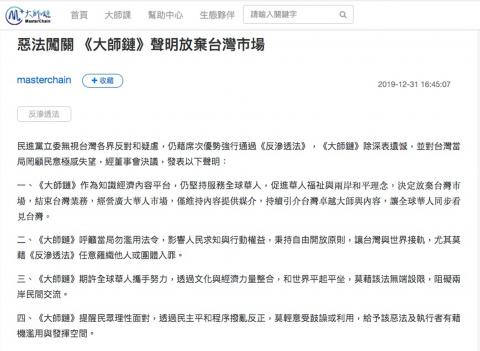The Chinese-language China Times yesterday vowed to sue a local media organization that accused it of contriving with Chinese authorities against the Anti-infiltration Act (反滲透法).
The Democratic Progressive Party (DPP), which has a majority in the Legislative Yuan, passed a third reading of the legislation on Tuesday.
The act aims to prevent meddling by external hostile forces, and ensure national security and social stability.

Screen grab from the Master Chain Web site
Pan-blue camp politicians, including People First Party Chairman James Soong (宋楚瑜), his party’s presidential candidate, have criticized the act as reinstating an autocratic system in Taiwan.
Chinese-language online news outlet Up Media reported on Tuesday that officials from China’s Taiwan Affairs Office (TAO) instructed news organizations under Want Want China Times Media Group (旺旺中時集團) to suspend their operations in protest against the law and the DPP.
Group chairman Tsai Eng-meng (蔡衍明) had agreed to suspend only the China Times, as its daily circulation is limited, Up Media reported.
However, during a meeting with Tsai on Tuesday, most management staff were reserved about such a move, so they decided not to suspend operations and continue to criticize the act while waiting to gauge the situation after the elections on Saturday next week, it reported.
Up Media’s “false report” has sabotaged the reputation of Tsai and the China Times, which today would file a lawsuit against the journalist who wrote the report, and Up Media’s president and chairman, the China Times said in a statement on its Web site.
The claim that the TAO and China Times personnel deliberated strategy against the act was sheer fabrication, it said.
The China Times is unwavering in its “connecting China” stance, while the Want Daily sticks to its belief that “Taiwan’s well-being is only possible with cross-strait rapport,” the China Times added.
As the papers cannot easily change their values, the China Times is considering how to present reports and commentaries without contravening the act, which is unclear, it said.
Meanwhile, online media start-up Master Chain (大師鏈), the first Taiwanese media organization to enter China, said it has decided to abandon the Taiwanese market.
Master Chain is deeply disappointed in Taiwanese authorities after DPP lawmakers pushed through the act, despite doubts about its content, it said in a statement on Tuesday.
Chinese worldwide should join hands to integrate their cultural and economic power, rather than obstructing cross-strait exchanges through legislation, it said.

Tropical Storm Gaemi strengthened into a typhoon at 2pm yesterday, and could make landfall in Yilan County tomorrow, the Central Weather Administration (CWA) said yesterday. The agency was scheduled to issue a sea warning at 11:30pm yesterday, and could issue a land warning later today. Gaemi was moving north-northwest at 4kph, carrying maximum sustained winds near its center of up to 118.8kph and gusts of 154.8kph. The circumference is forecast to reach eastern Taiwan tomorrow morning, with the center making landfall in Yilan County later that night before departing from the north coast, CWA weather forecaster Kuan Shin-ping (官欣平) said yesterday. Uncertainty remains and

SEA WARNING LIKELY: The storm, named Gaemi, could become a moderate typhoon on Wednesday or Thursday, with the Taipei City Government preparing for flooding A tropical depression east of the Philippines developed into a tropical storm named Gaemi at 2pm yesterday, and was moving toward eastern Taiwan, the Central Weather Administration (CWA) said. Gaemi could begin to affect Taiwan proper on Tuesday, lasting until Friday, and could develop into a moderate typhoon on Wednesday or Thursday, it said. A sea warning for Gaemi could be issued as early as Tuesday morning, it added. Gaemi, the third tropical storm in the Pacific Ocean this typhoon season, is projected to begin moving northwest today, and be closest to Taiwan on Wednesday or Thursday, the agency said. Today, there would likely

DISRUPTIONS: The high-speed rail is to operate as normal, while several airlines either canceled flights or announced early departures or late arrivals Schools and offices in 15 cities and counties are to be closed today due to Typhoon Gaemi, local governments announced last night. The 15 are: Taipei, New Taipei City, Taoyuan, Tainan, Keelung, Hsinchu and Kaohsiung, as well as Yilan, Hualien, Hsinchu, Miaoli, Chiayi, Pingtung, Penghu and Lienchiang counties. People should brace for torrential rainfall brought by the storm, with its center forecast to make landfall on the east coast between tonight and tomorrow morning, the Central Weather Administration (CWA) said. The agency issued a sea warning for the typhoon at 11:30pm on Monday, followed by a land warning at 11:30am yesterday. As of

CASUALTY: A 70-year-old woman was killed by a falling tree in Kaohsiung as the premier warned all government agencies to remain on high alert for the next 24 hours Schools and offices nationwide are to be closed for a second day today as Typhoon Gaemi crosses over the nation, bringing torrential rain and whipping winds. Gaemi was forecast to make landfall late last night. From Tuesday night, its outer band brought substantial rainfall and strong winds to the nation. As of 6:15pm last night, the typhoon’s center was 20km southeast of Hualien County, Central Weather Administration (CWA) data showed. It was moving at 19kph and had a radius of 250km. As of 3pm yesterday, one woman had died, while 58 people were injured, the Central Emergency Operation Center said. The 70-year-old